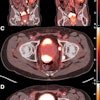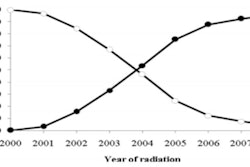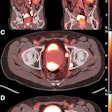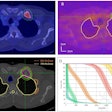Patients with oligodendroglioma brain tumors with a specific chromosomal abnormality double their survival outcomes when they undergo a combined chemoradiotherapy treatment, according to long-term findings of a clinical trial that will be presented this week at the American Society of Clinical Oncology (ASCO) annual meeting.
In the randomized phase III Radiation Therapy Oncology Group (RTOG) 9402 trial, 291 patients were enrolled to evaluate overall survival. Ogligodendroglioma brain tumors represent approximately 9% of all adult primary brain and central nervous system tumors. Patients whose ogligodendroglioma brain tumors lacked both the 1p and 19q chromosomes and who underwent chemoradiotherapy lived twice as long (median 14.7 years) as similar patients who underwent radiotherapy alone (median 7.3 years).
The findings have significant implications for patients with anaplastic oligodendrogliomas, according to principal investigator Dr. J. Gregory Cairncross, professor and head of the University of Calgary's department of clinical neurosciences in Alberta, Canada. He said that the chromosomal structure of 1p and 19q co-deletion can be used as a marker to determine which patients will benefit from combined chemotherapy and radiation therapy.
The RTOG 9402 trial, conducted from 1994 to 2002, was one of the first to determine that the genetic makeup of a brain tumor determines the magnitude of treatment effectiveness. The trial's long-term results are substantiated by similar results from the European Organization for Research and Treatment of Cancer (EORTC) 26081-22086 clinical trial, Cairncross said.
The findings represent practice-changing results, according to Dr. Walter Curran Jr., RTOG group chair and executive director of the Winship Cancer Institute of Emory University. The RTOG 9402 long-term results provided important information that prompted the closure of RTOG 1071, a randomized phase III clinical trial being conducted by the North Central Cancer Treatment Group, he added.



















